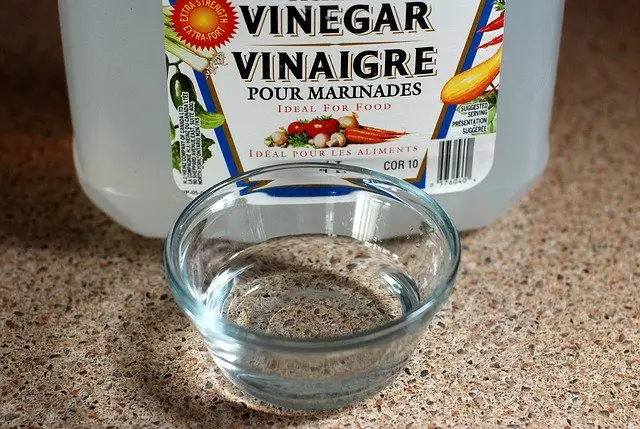Vinegar is widely used for a lot of things around the house, including cleaning. White vinegar is best for cleaning purposes because of it’s highly acidic nature (2.5 on the pH scale) which means it has a lot of acetic acid content which is responsible for most of the cleaning job.
While vinegar is loved and praised for its cleaning powers, we’d love to know if its usage can extend past the kitchen countertops and floor rugs — we’d love to know if vinegar can be used inside the dishwasher for cleaning efforts?
Absolutely! White vinegar can be used inside the dishwasher to remove lingering odor and disinfect to some extent. It’s an extremely powerful ingredient for that purpose but real care must be taken to avoid over usage which can end up destroying some components inside the dishwasher.
In the rest of the article, we’ll describe how you can use vinegar inside the dishwasher for the aforementioned purpose, how often you should go about the practice, what other ingredients you can put inside the dishwasher for cleaning, and some of the most interesting uses of vinegar in our household.
How To Use Vinegar In The Dishwasher
White vinegar plays a tremendous role as a cleaner and mild disinfectant. It’s high concentration of acetic acid ensures it’s able to cut through mineral deposits from hard water and wipe away tough grime and gunk in cervices and surfaces.
White vinegar (5% acetic acid concentration) is 90% effective against fungus like mold and 95% effective against bacteria, just a little less effective than bleach — it’s household cleaning counterpart.
When it comes to cleaning, a 100 percent solution of vinegar is recommended to reap the most benefits, and for dishwasher application, especially at the gasket and seals, a 50/50 solution with water is recommended because consistent usage of highly concentrated vinegar can destroy fittings and gaskets in there.
Here’s how to use white vinegar in the dishwasher for cleaning, disinfecting and for removing odor.
- Ensure the dishwasher is empty by taking out all the dishes from it.
- Inspect holes and cervices for food particles and remove them. These are responsible for the stench emitted by dishwashers, and so long they’re in there, no amount of distilled white vinegar will completely eliminate the smell they emit. And by the way, learn to incorporate this as part of every wash session, meaning that you inspect and remove food particles from the inside of the dishwasher after every wash session.
- Clean filter combination and also the drain sump. Remove the filters as per manufacturer’s instructions and run under warm tap water using nylon brush to scrub off food particles and grime that build up in them. Use detergent in heavily soiled cases. This part of the job is what you should be doing at least every week.
- Clean the spray arms by unclogging them with pins and running them under warm tap water. This part of the job should be done every week too.
- Clean the racks with sponge and soapy solution. This can be done quarterly since they don’t get as dirty as the other components.
- Replace the filters, racks and spray arms back into the dishwasher.
- Pour one cup of white vinegar solution into a small bowl and place at the top rack of the dishwasher. Run a normal cycle. Make sure to avoid using detergent.
- Open the door and allow it to dry.
Then for heavily soiled door frames and gaskets, you can create a solution of 50 percent water and 50 percent vinegar and use it to wipe them clean. Then dry with a soft cloth.
Avoid depending on vinegar to clean the seals and gasket as it can damage them overtime, use a mixture of equal parts baking soda and dish soap and apply all around in a scrubbing fashion using nylon brush. Then wipe clean with a cloth.
Use only a moistened cloth (in dish soap solution) for the interior and resort to brushes to release stuck on bits.
In the case of touchscreen panel or buttons on the edge, use a soft microfibre cloth moistened with warm water and wringed very well to wipe off dirt from the surface.
For the exterior of your dishwasher, see the manual for the most recommended cleaner for the type of material you have as some can cause discoloration. The best and safest bet is warm water and a soft microfiber cloth.
However, an all purpose cleaner formulated with vinegar, warm water and dish soap in the ratio 3:2:1, should work well too. Wipe down with a dry cloth afterwards and that’s it.
Your dishwasher will be stripped of its odor, and will be disinfected and cleaned from inside out.
While vinegar is recommended to clean and disinfect dishwashers, most dishwashers are self cleaning and disinfecting especially when the intensive program is run at least once a month.
In the case above, limit the use of vinegar to only once in two to three months. In that span of time however, on a monthly basis, ensure to inspect your dishwasher often, and give it a good cleaning when it needs one.
Here’s how to clean a dishwasher without vinegar.
- Clean the filters
- Clean the drain sump which the filters cover.
- Inspect holes in the dishwasher for food particles.
- Clean the racks.
- Clean the door interior, edges and seals as instructed above.
- Run a normal cycle in eco mode with a dishwasher cleaner like cascade and open the door to dry. Make sure to really follow the “dishwasher cleaner” instructions to avoid creating a mess for yourself.
What Household Ingredients Can You Use To Clean A Dishwasher?
- Baking soda: Sprinkle one cup of baking soda on the bottom of the dishwasher to help with odor.
- Citrus crystals: Pour four tablespoons in the detergent cup of your dishwasher and run a normal cycle without any dishes, this would help with mineral deposits, disinfection, and removal of odor.
What Other Cleaning Applications Does Vinegar have around the house?
- Vinegar can be used to spot clean laminate floors like pegro. Make a solution of equal parts vinegar, water and rubbing alcohol and put in a spray bottle. Whenever you want to spot clean, shake well and spray, the vinegar plus water will tackle the dirt and stain while the rubbing alcohol ensures your floor doesn’t stay wet for too long.
- Spray vinegar over stickers and let sit for at least 15 minutes to remove them.
- Spray a solution of 50/50 water and white vinegar and use it to clean carpet stains and windows.
- To remove smoke smell, add two cups of vinegar to a bucket of hot water and hang cloth over the solution.
What Else Can You Put Inside A Dishwasher?
Bleach: Use bleach to achieve an even better cleansing for your dishwasher interior. It sanitizes way better than vinegar and it’s affordable too. While using bleach, you want to be very careful in making sure that no stainless steel component is embedded in your dishwasher interior, otherwise, bleach can react and corrode it.
Sponge: We’d be wrong to assume that sponges do a pretty good job at cleaning themselves after every wash, because they have lather spread all over them during cleaning. In fact, sponges are one of the filthiest items in the house, and one of the best ways to sanitize them is to put them inside the dishwasher and run a normal cycle.
Yeti Cups: These are perfectly fine to put inside the dishwasher for cleaning. Prior to cleaning, you want to disassemble them first and arrange all components on the top or utensil rack. Read to learn more about how to clean yeti cups in the dishwasher.
Tupperware: While not all tupperware food storage containers are safe to put inside the dishwasher, for fear that they may deteriorate in quality, most are perfectly fine to dishwash.
Final Thoughts
Manufacturers are quick to point out the benefits of running a wash cycle having a cup full of white vinegar placed on the top rack of the dishwasher, while at the same time, they’re also quick to draw our attention to the damage that could be incurred (to the gasket and rubber seals) when we rely too heavily on vinegar as a cleaning agent for our dishwashers.
So, use vinegar once every 2 to 3 months for an extensive cleaning of your dishwasher or resort to dishwasher cleaners like cascade for the job.
Without doubt however, vinegar does have tremendous cleaning powers that leave us with no option but to exploit.


